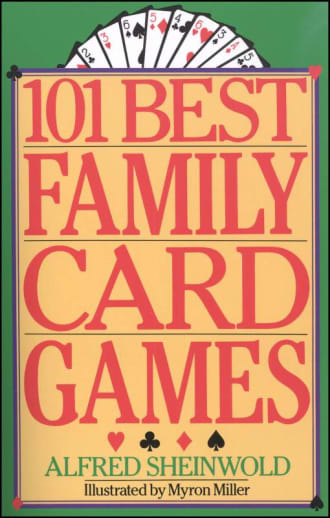I didn't even know most of these 101 card games existed, but it looks like they are all great fun! Learn secret tips of each game while also learning sportsmanship, teamwork, and even math! This book has it all - Casino, War, Card Dominoes, Stops, Rummy, Solitaire for when there is no one else around to play with, and that's just the beginning. The book opens with games that very young children can enjoy with their parents and progresses to introduce more complicated games for older players. The directions for each card game are explained clearly by Alfred Sheinwold, "one of the world's top authorities on card playing," so that both children and their parents can understand the games and rules of play. Sheinwold also gives useful tips, which you can pass on (or just keep to yourself). Black-and-white illustrations are included to show game play. Keep this one handy for family game night! 128 pgs. ~ Jon
101 Best Family Card Games
SKU
014825
ISBN
9780806986357
Grade PK-AD
These icons are designed to help you quickly understand and learn important information about our products.
Teaching Method
Traditional
Teacher-centered curriculum commonly used in classrooms that may include a text, teacher manual, tests, etc.
Charlotte Mason
A methodology based on the work of a 19th century educator who maintained that children learn best from literature (Living Books), not textbooks.
Classical
A methodology based on the Latin Trivium (three stages of learning), including the grammar stage (memorization and facts), logic stage (critical thinking), and rhetoric stage (developing/defending ideas).
Unit Study
A thematic or topical approach centered around one topic that integrates multiple subject areas.
Montessori (Discovery)
A methodology based on the work of a 20th century educator that emphasizes student and sensory-driven discovery learning and real-life applications.
Other
Other methodologies
Religious Content
Secular
Contains content contrary to common Christian beliefs (i.e. evolution).
Neutral
Avoids religious or theoretical topics or presents multiple viewpoints without preference.
Christian/Religious
Faith-based or including instructional religious content.
Learning Modality
Auditory
Learns through listening, talking out loud or reading out loud.
Visual
Learns through seeing, prefers written instructions and visual materials.
Kinesthetic/Tactile (Hands-On)
Learns through moving, doing and touching.
Multi-Sensory
Curriculum that employ a variety of activities/components.
Presentation
Sequential
Curriculum progresses through well-defined learning objectives. Emphasizes mastery before moving to the next topic.
Spiral
Topics and concepts are repeated from level to level, adding more depth at each pass and connecting with review.
Conceptual/Topical
Focus is on the “why,” often with a unifying concept as well as specific skills; coverage may be broader.
Teacher Involvement
Low Teacher Involvement
Student-led materials; parent acts as a facilitator.
Medium Teacher Involvement
A mix of teacher-led time and independent student work.
High Teacher Involvement
Teacher-led lessons; may utilize discussions, hands-on activities and working together.
Additional Materials Required
No other materials needed
Everything you need is included.
Other Materials Required
There are additional required resources that are a separate purchase.
Other Materials Optional
There are additional resources mentioned or recommended but are not absolutely necessary.
Consumable
Consumable
Designed to be written in; not reusable.
Non-Consumable
Not designed to be written in; reusable.
Our Price
$8.95 $8.95 $6.95
Rainbow Savings: $2.00
Description
Details
| Product Format: | Softcover Book |
|---|---|
| Grades: | PK-AD |
| Brand: | Sterling Publishing Company |
| Author: | Alfred Sheinwold |
| ISBN: | 9780806986357 |
| Length in Inches: | 8 |
| Width in Inches: | 5.5 |
| Height in Inches: | 0.5 |
| Weight in Pounds: | 0.35 |
| Edition: | Illustrated |
| Illustrated by: | Myron Miller |
| Pages: | 128 |
| Publication Date: | 9/3/2013 |
Videos
Reviews

